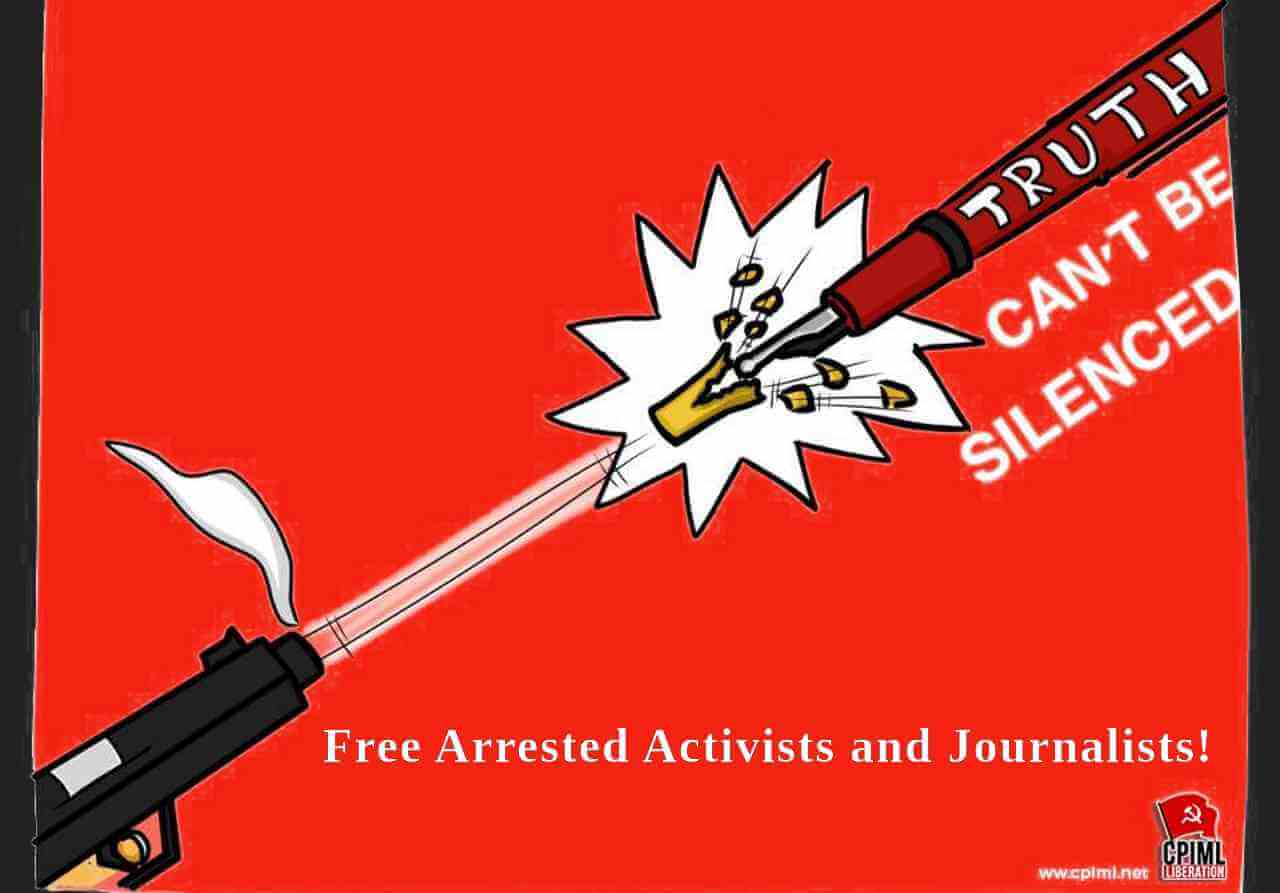Free Arrested Activists and Journalists!

The arrests of activist Teesta Setalvad, Retired IPS officer RB Sreekumar, and Fact-Checker and journalist Mohammed Zubair demonstrate the Modi government’s vengefulness against those who fearlessly held Modi and Shah accountable for communal violence, and exposed hateful propaganda by BJP leaders.
It is ironic that even as Narendra PM Modi signed the G7 pledge to protect 'freedom of expression, opinion online and offline', and the PM condemned Emergency-era censorship, Mohammed Zubair was arrested on the pretext of a 2018 tweet, and the GOI instructed Twitter to withhold tweets critical of the Indian government’s record on declining internet freedom in India! It has issued similar instructions for tweets by the journalists Rana Ayyub and Mohammed Zubair, and has also instructed the suspension of the entire handles of Kisan Ekta Morcha and @Tractor2twitr, both of which contributed immensely to informing the public about the nature and scale of the farmers’ protests last year.
A day after the Supreme Court dismissed a petition appealing a lower court’s refusal to file a case against Narendra Modi for his role in Gujarat’s anti-Muslim violence of 2002, the anti-terrorism squad (ATS) of the Gujarat policy have picked up Teesta Setalvad on the basis of an FIR registered by the crime branch of the Ahmedabad police. What is especially disturbing is that the Supreme Court bench, in dismissing the petition of Zakia Jafri, exceeded its brief and suggested that Teesta Setalvad who supported victims of Gujarat 2002 riots in their pursuit of justice, and the few Gujarat IPS officers who testified to the complicity of the Gujarat Government in the riots, should be ‘put in the dock.’ The FIR against Setalvad uses these baseless paragraphs from the judgment to justify their grounds for arrest.
The fact is that Setalvad’s organisation, Citizens for Justice and Peace, has tirelessly pursued cases relating to the 2002 anti-Muslim massacres in Gujarat that took place under Narendra Modi as Chief Minister: especially the Gulberg Society and Naroda Patiya killings. The latter case led to the conviction of prominent BJP leader and former minister Maya Kodnani. In all, Setalvad and her organisation helped secure 120 convictions in 68 cases involving nine major Gujarat riot incidents: a rare achievement when perpetrators in most cases of targeted caste and communal massacres in India go scot-free. The Supreme Court bench admitted the Gujarat Government’s failure to control the riots. The fact is that the Gujarat Government of the time also failed to pursue justice for the victims. In fact the Supreme Court had to order the cases to be tried outside Gujarat – a key factor that prevented the Gujarat Government from silencing survivors and witnesses and made convictions possible in so many cases. How can the judges on the SC bench now brand the quest for justice, facilitated by the SC institution itself, to be a conspiracy of politically motivated elites in “air-conditioned rooms”? The Supreme Court bench’s observations encouraged the same police that failed to prevent a massacre, to criminalise activists who sought to hold them accountable. This is a dangerous precedent that can only deter the quests for justice in cases of massacres of Dalits, Adivasis, and Muslims in India.
On 27th June, Mohammed Zubair, the co-founder of the fact-checking website AltNews, was arrested by Delhi Police’s IFSO. The pretext for his arrest was a 2018 tweet of an image from the 1983 movie Kisi Se Na Kehna. Zubair has been on the crosshairs of the Hindutva state establishment for his tireless efforts to expose disinformation campaigns and hate speech. Most recently he had highlighted sections of an interview by BJP spokesperson Nupur Sharma, where she indulged in hate speech against the Prophet Mohammed and by insinuation denigrated and dehumanized the entire Muslim community. The resulting international furore forced the BJP to distance itself from Sharma. Zubair’s arrest is obviously the Modi regime’s revenge for the international embarrassment suffered by it. Ironically, while Ms Sharma continues to evade arrest with total impunity, the Delhi Police has arrested Zubair on a flimsy pretext.
The Modi regime, as with all authoritarian regimes, uses the arrest of journalists as a tool to stifle any possible critical scrutiny. In fact the Prime Minister has on multiple occasions suggested that journalists’ job is to propagate the “good works” of the government (like court poets of yore) rather than print “negative” critical stories. In fact the most influential media houses in India actually do serve as propagandists rather than journalists whose job in any democracy is to scrutinise Government and hold it accountable. We remember how journalists Samriddhi K. Sakunia and Swarna Jha were arrested last year for exposing lies by the Tripura police regarding the riots and violence against Muslims unleashed in the state. The Committee to Protect Journalists has pointed out that 24 journalists were killed in the year 2021 for their work, while several are behind bars including Siddique Kappan, Manan Gulzar Dar, Aasif Sultan, Rajeev Sharma, and Tanveer Warsi. The World Press Freedom Index published by Reporters Without Borders (RSF) has seen India slide further and further downwards in terms of press freedom with the current ranking of 150 out of 180 countries.
The Modi regime is reducing the Constitution to window-dressing even as the police forces in Gujarat, UP, and Delhi openly enact revenge and violence against activists and journalists who dare to hold the BJP and its governments accountable. It has never been more urgent for India’s people to defend every principle of democracy and demand accountability from every institution, including the media and courts, that have a duty to defend the freedoms and protections guaranteed to all citizens by the Constitution.
Charu Bhawan, U-90, Shakarpur, Delhi 110092
Phone: +91-11-42785864 | +91 9717274961 E-mail: info@cpiml.org

